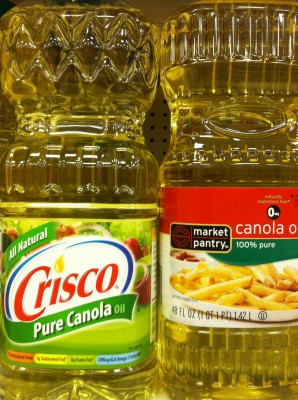Described as “heart-healthy” and “affordable,” canola oil is claimed by manufacturers to be among the healthiest standard cooking oil [2]s available.
But despite its support from the Food and Drug Administration, not everyone is convinced of the oil’s supposed benefits.
Canola oil was created first in the 1970s in Canada. The oil – which is made from rapeseed — has since been praised for its low saturated fat [3] content, as well as for being free of cholesterol and trans fats, said Maanasi Radhakrishnan with StyleCraze.org.
“Canola oil is rich in monounsaturated fat, reducing the risk of coronary disease and a rich source of omega-6 fatty acid, essential for growth and development of the brain in individuals,” Radhakrishnan said. “Clinical trials and studies reveal that consuming Canola oil instead of other cooking oils impacts the body favorably and offer the individual significant health improvements and increased metabolism.”
The industry-backed CanolaInfo.org website also stated that canola oil provides cancer-fighting vitamin E [4], along with a host of other vitamins.
Could This All-Natural ‘Detox’ Capsule Have Extended John Wayne’s Life? [5]
“It has been rigorously tested and approved by authoritative scientific bodies for human consumption,” the website said. “In fact, canola oil is recognized as a heart-smart cooking oil by many health organizations,” including the American Heart Association and the American Cancer Society.
But canola oil also is cheap to produce [6], which certified nutrition specialist Mike Geary said could be the primary drive behind the oil’s soaring popularity among manufacturers and federal governments alike.
Highly processed oils, including canola oil, can cause inflammation in the body and result in not only weight gain but disease, including heart disease, said Geary. Free radicals are also created in the oil from the intense manufacturing process and can damage cell membranes.
“Canola oil … is typically extracted and refined using high heat, pressure and petroleum solvents,” Geary said. “Most canola oil undergoes a process of caustic refining, degumming, bleaching, and deodorization, all using high heat and questionable chemicals.”
 [7]The “questionable chemicals” Geary mentioned include hexane, which Vani Hari [8] from the FoodBabe.com website described as both a gasoline byproduct and a neurotoxin. (Listen to Off The Grid Radio’s interview with Hari here [9].)
[7]The “questionable chemicals” Geary mentioned include hexane, which Vani Hari [8] from the FoodBabe.com website described as both a gasoline byproduct and a neurotoxin. (Listen to Off The Grid Radio’s interview with Hari here [9].)
“It’s been shown that some hexane residue can remain in the oil, and the FDA doesn’t require food manufacturers to test for residues,” Hari said. “Residue tests done by the Cornucopia Institute in 2009 found hexane residues in soybean oil. So, we very well could be eating this chemical every time we cook with hexane-extracted oils. Almost all toxicology research focuses on the industrial use and inhalation of hexane, so no one knows exactly how dangerous eating it is – but it surely isn’t healthy.”
Canola oil and other cooking oils, Hari wrote, “go through an insane amount of processing with chemical solvents, steamers, neutralizers, de-waxers, bleach and deodorizers before they end up in the bottle.”
Story continues below video
Also, canola oil actually does contain artificial trans fat, said Guy Crosby [10], adjunct professor of nutrition at Harvard.
“Read the fine print that states zero grams of trans-fat per serving, which is only one tablespoon, or about 14 grams of oil,” Crosby said. “The FDA allows any component that is less than 0.5 grams per serving to be listed as zero grams! Despite this claim, virtually all vegetable oils sold in the supermarket contain small amounts (less than 5%) of trans-fat.”
In addition, the majority of canola oil on grocery store shelves is genetically modified. While canola oil was created naturally at first, Monsanto developed a genetically modified version of rapeseed in 1995. Nearly 90 percent of canola oil sold in the United States and Canada is now genetically engineered.
“Although many states are fighting for GMO labeling, food manufacturers are still not required by law to tell you if their products contain GMO’s,” Dr. Josh Axe stated on his website. “It’s up to us to be well-informed and read the labels.”
Although Brierley Wright with EatingWell.com dismissed the claims of canola oil’s harmful effects, she suggested buying organic canola oil [11] to avoid genetically modified oil.
Axe also said to use canola oil substitutes — including coconut oil, extra virgin olive oil, red palm oil and organic pastured butter or ghee — to ensure the greatest nutritional benefits with the least amount of health hazards.
Do you use canola oil? What types of oil do you use? Share your thoughts in the section below:
Harness The Power Of Nature’s Most Remarkable Healer: Vinegar [12]
